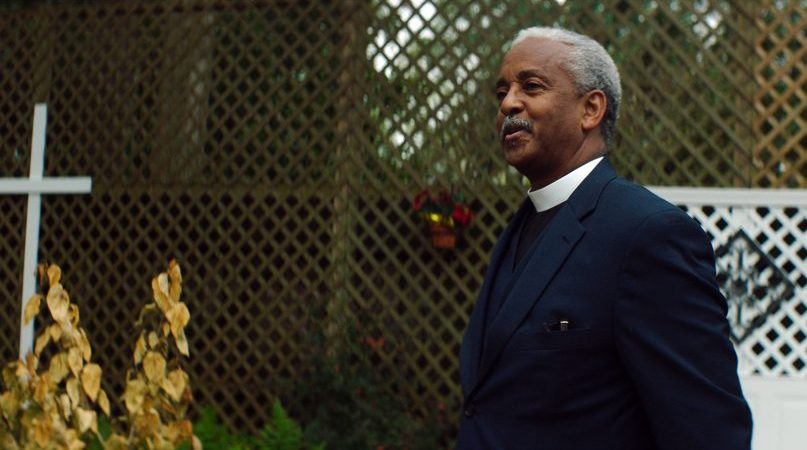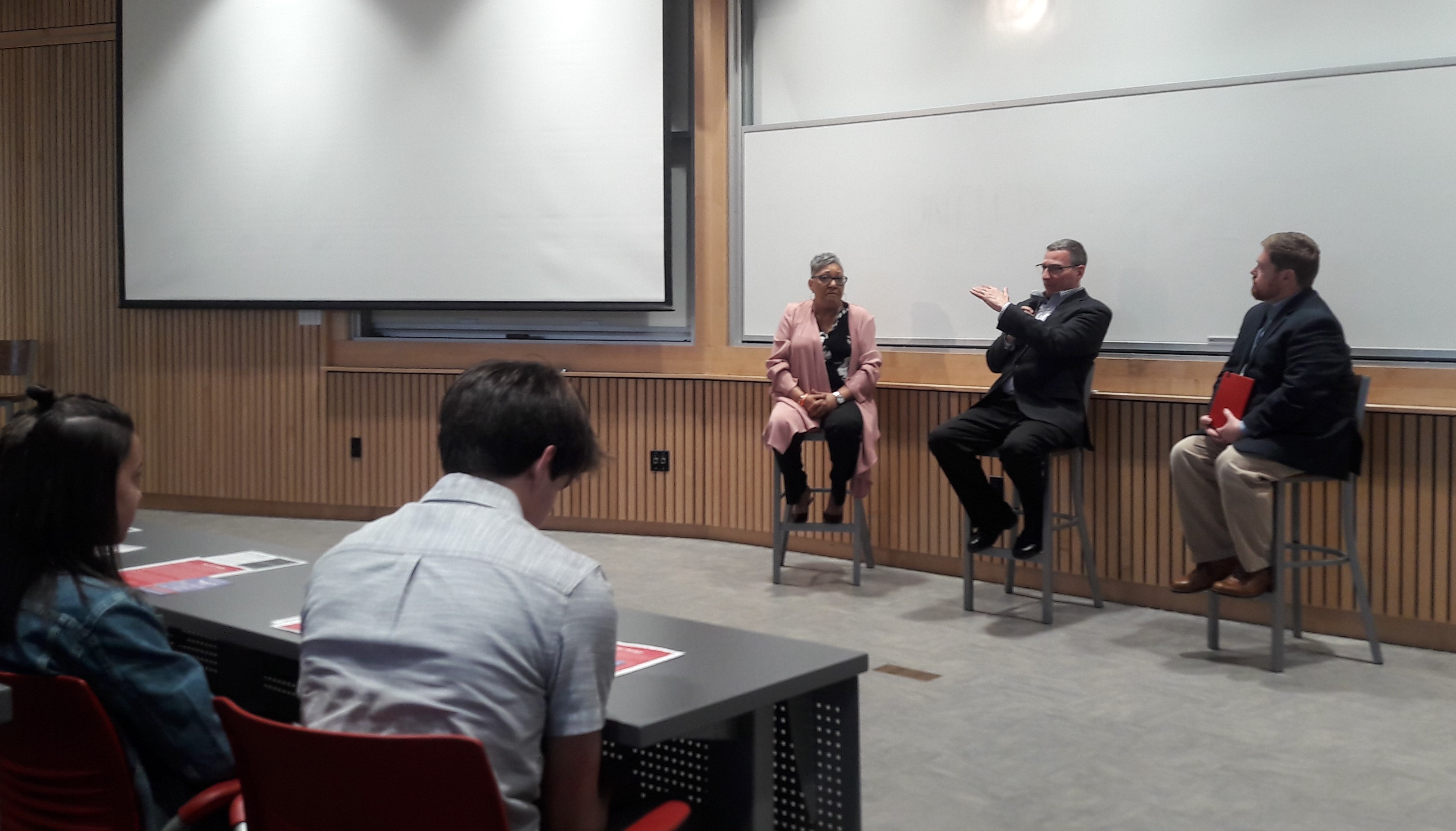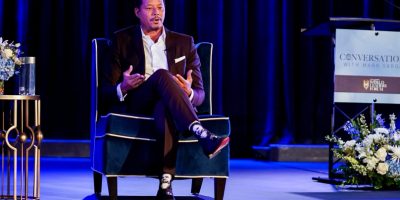Showing how faith and forgiveness healed Charleston church shooting survivors
Wheaton College screens new documentary ‘Emanuel’

By Tom Siebert
WHEATON, Ill., June 11, 2019 — Gun massacres are a common occurrence in American life. During this year alone in the United States, there have been more than 150 shootings that caused four or more casualties, according to the nonprofit Gun Violence Archive.
When a mass shooter strikes a place of worship, however, the bullets emotionally pierce not only our hearts and minds, but ricochet straight through to our souls.
Such was the tragic case on the evening of June 17, 2015, when 21-year-old white supremacist Dylann Roof walked into Emanuel African Methodist Episcopal (AME) Church in Charleston, S.C., sat through a Bible study, then pulled out a .45-caliber semiautomatic handgun and shot to death nine black worshipers as they stood up to pray.
Last night Wheaton College hosted a screening of a brilliant new documentary about the Charleston massacre, titled “Emanuel,” before an audience of more than 100 people that included students, church leaders, and members of the community.
In the film, one of the three shooting survivors describes the horrific crime. “We closed our eyes to pray,” said Polly Sheppard solemnly. “That’s when he lit up the room.”
Another survivor, Felicia Sanders, recounts speaking to the shooter in the midst of his killing spree: “When he spoke to me, I was on the floor looking up at him from under the table. He just stopped and he said, ‘Did I shoot you yet?’ And I said, ‘No.’ And he said, ‘I’m not going to. I’m going to leave you here to tell the story.”’
Ms. Sanders also tearfully recalled shielding her five-year-old granddaughter on the floor, saving the girl’s life, while watching in vain as her son Tywanza was shot to death across the room. “I felt every bullet that went into him,” she said, choking up.
Even more shocking than the shooting was the scene two days later when the mass murder suspect, wearing a gray-and-white jail jumpsuit as well as wrist and ankle shackles, appeared via video conference for a bail hearing in Charleston County court.
Some of the shooting survivors and victims’ relatives showed up in court, where Chief Magistrate James “Skip” Gosnell, Jr., asked them if they wished to speak.
The film portrays this tense encounter with somber silhouettes of the speakers slowly moving across the screen as audio from the hearing is played.
Rev. Anthony Thompson reminisces about his late wife Myra in the garden that he built for her after she and eight others were shot to death at Mother Emanuel Church in Charleston, S.C., in June 2015.
Nadia Collier, daughter of the slain Ethel Lance, is heard saying to Mr. Roof: “I will never be able to hold her again, but I forgive you, and have mercy on your soul. You hurt me. You hurt a lot of people but God forgives you, and I forgive you.”
Ms. Sanders told him: “We welcomed you Wednesday night in our Bible study. We enjoyed you. May God have mercy on you.”
And Rev. Anthony Thompson, the pastor of a nearby church whose wife Myra was among those shot dead, tells the mass killer: “I forgive you. And my family forgives you. But we would like you to take this opportunity to repent. Repent. Confess. Give your life to the one who matters the most, Jesus Christ.”
Filmed mostly inside the 203-year-old church, colloquially called “Mother Emanuel,” and the homes of victims’ relatives, the 75-minute, award-winning documentary was financially backed by Viola Davis, an Oscar-winning actress and South Carolina native; and superstar point guard Stephen Curry of the Golden State Warriors.
Director Brian Ivie (“The Drop Box”) also employs the filmmaking technique called “cinema verite,” using actual television footage that showed how the monstrous act turned downtown Charleston into a frantic, flooded mass of screaming police cars, TV news trucks, hurried EMS workers, and panicked onlookers.
In addition to reporting the terrible story in a raw, riveting way, Mr. Ivie manages to seamlessly weave into the narrative Charleston’s sordid past as a slave port, South Carolina’s history as the only one of the 13 colonies that had a majority black population, and Mother Emanuel’s role in the civil rights movement.
The film also recounts Mr. Roof’s history of hatred, which included a racist manifesto that he had written as well as photos of him waving a Confederate flag and posing before symbols of white supremacy. And he is chillingly shown entering the church on a side-door surveillance camera, his fanny pack concealing his weapon of mass destruction.
The Confederate battle banner, long a source of controversy in Southern cities such as Charleston, was removed from the grounds of the South Carolina State House within three weeks of the tragedy. Then-Gov. Nikki Haley skillfully negotiated the move with state legislators and local guardians of Civil War culture.
Mr. Roof was convicted of mass murder and hate crimes, and is now awaiting execution. He had hoped to spark a national race war, the FBI stated.
But Charleston remained calm in the aftermath of the shootings, thanks to the forgiving sentiments of the survivors, calming words of city leaders, prayer vigils of activist groups like Black Lives Matter, and presence of President Barack Obama, who led mourners in the singing of “Amazing Grace” at the funeral of the church’s prominent pastor.
Most of all, the documentary honors the so-called “Charleston Nine.” They were: State Sen. Clementa C. Pinckney, 41, and pastor of Mother Emanuel; Cynthia Marie Graham Hurd, 54, manager of the Charleston County Public Library system; Susie Jackson, 87, a member of the church choir; Ethel Lee Lance, 70, the church sexton; Depayne Middleton-Doctor, 49, a pastor and admissions coordinator at Southern Wesleyan University; Tywanza Sanders, 26, a member of the Bible study and grandnephew of fellow shooting victim Susie Jackson; Daniel L. Simmons, 74, a pastor who served at Greater Zion AME church in nearby Awendaw; Sharonda Coleman-Singleton, 45, a pastor, speech therapist, and track coach at Goose Creek High School; and Myra Thompson, 59, a Bible study teacher.
Perhaps the most poignant scene in the movie was the interview with Myra’s husband, Rev. Thompson, in the garden that he built for his late wife behind the church. The reverend recollected not being able to touch his spouse earlier on the day she died because “God already had her.”

The film screening was followed by a question and answer segment that included Rev. Sharon Risher, whose mother, two cousins, and a friend were killed in the gun tragedy. Rev. Risher said that forgiveness did not come quickly for her. “It took me two years. I was angry at God. I argued with him.”
She is the author of “For Such a Time as This: Hope and Forgiveness after the Charleston Massacre,” in addition to being the spokesperson for both the Everytown Survivor Network and Moms Demand Action for Gun Sense in America.
Others on the panel were the Rev. Dr. Rob Schenck, president of the Dietrich Bonhoeffer Institute, and Dr. Jamie Aten, founder of the Humanitarian Disaster Institute.
Rev. Schenk, who ministers to elected officials in Washington, D.C., told the audience that “the church has a role to play” in the prevention of gun violence. And Dr. Aten, a psychologist, said that he was called upon to comfort the loved ones of the five people killed and six police officers injured in the mass shooting at a manufacturing plant in Aurora last February.
Pastor Sharon noted that the Charleston shooter should not have been able to legally buy his gun, since he had been arrested four months earlier on a felony drug charge.
She asserted that mental health screenings should be included in background checks for gun purchases, and further questioned the need for assault weapons as well as the seven ammunition magazines that Mr. Roof carried with him into the church.
During the six-minute shooting, he reloaded his weapon five times with large hollow-point bullets, according to police reports.
Also appearing at the Wheaton College screening was the film’s producer, John Shepherd, a Glen Ellyn native who now lives in Santa Monica, Calif. Mr. Shepherd, who has many acting and producing credits, said, “We need to start a national dialogue about gun violence.”
“Emanuel” is an uplifting lesson about how to forgive the next mass shooter. But it does not tell us how to stop him. Moreover, it is too late to prevent another Charleston. Since the Mother Emanuel shootings, some of the worst gun massacres in U.S. history have occurred.
Later in 2015, 14 people were shot to death at a social services building in San Bernardino, Calif.; 49 at a nightclub in Orlando, Fla., in 2016; 27 at the First Baptist Church in Sutherland Springs, Tex., in 2017; a record 59 at a country music concert in Las Vegas, later in 2017; 17 at Marjory Stoneman Douglas High School in Parkland, Fla., in 2018; 11 at the Tree of Life synagogue in Pittsburgh, also in 2018; 12 at a bar and grill in Thousand Oaks, Calif., again in 2018; and 11 at a public works building in Virginia Beach, Va., 17 days ago.
Since 1963, nearly 1.7 million people have died from shootings in America, according to the U.S. Centers for Disease Control and Prevention (CDC). Among those shot to death were President John F. Kennedy; civil-rights leader Martin Luther King, Jr.; Senator Robert F. Kennedy of New York; and singer-songwriter John Lennon of The Beatles.
“Emanuel” will break your heart in a million tiny pieces. But the grace and goodness of the survivors will painstakingly put it back together and restore your hope for humanity.
The film will be shown nationwide in selected theaters on June 17 and June 19, the anniversaries of the shootings and court hearing, respectively.
Mr. Shepherd said that Academy Award-winning actress Charlize Theron and multiple Grammy winners Stevie Wonder and Justin Timberlake have paid in advance for two-week showings of “Emanuel” in Los Angeles and Nashville.
The producers are currently looking for a distributor so the documentary can run longer in movie houses. They have pledged to donate all of the box-office profits to the victims’ families. Those who wish to learn more about the film or contribute to the survivors fund may visit www.emanuelmovie.com.
Following the screening and discussion, Rev. Risher led the Wheaton College audience in prayer. She did not lower her eyes.
Read another article by Tom Siebert… https://xpian.news/2019/05/17/shark-tank-star-mark-cuban-jaws-about-health-and-happiness-at-judson-universitys-world-leaders-forum/

Tom Siebert
Tom Siebert has a BS in journalism from the University of Illinois and many years' experience as a writer/editor. As seen in: Chicago Tribune, Medium, The Beacon News, Barrington Courier-Review,Patch, South Florida Sun Sentinel, San Diego Citybeat




Comments are Closed